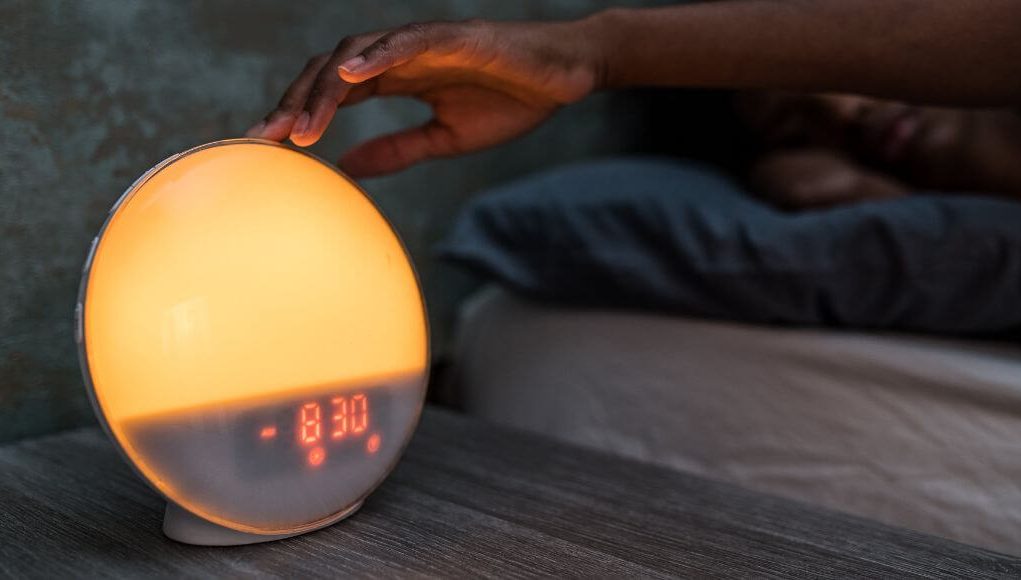Are you tired of hearing your alarm clock going off in the morning? If there’s a way for you to wake up on time without having to listen to the same annoying tune from your phone, would you give it a go?
There’s no denying that waking up in the morning is difficult. It does not matter whether you’re in deep sleep or you’re in your personal dreamland. Getting up at the sound of your first, second, third, fourth, or even fifth alarm is hard to accomplish!
So, how can you ditch your pesky alarms, wake up precisely when needed, and get out of bed without feeling sluggish and irritated? The answer to your problems may be a sunrise alarm!
What is a sunrise alarm?
A sunrise alarm got its name because of the nature of its function. It mimics the sun. Yes, that gigantic campfire that you see lighting up the sky and triggering your internal body clock, giving signals for you to wake up.
Typically, sunrise or wake-up lights will gradually increase the brightness in your space, transitioning from red to orange to soft yellow. Some also include auditory features like the sound of nature or a sunset function that helps you prepare for the night.
Should you get a Sunrise Alarm?
Other than waking you up in the morning, sunrise alarms have other benefits. So, if you’re considering buying but are not yet sold, here are 5 reasons that may convince you!
Reason #1: Eliminates the unpleasant alarm sounds
No one likes to wake up at the sound of their alarms. It can become so bad that you suddenly feel annoyed even when you hear it in the middle of the day! With a sunrise alarm, there’s no loud buzzing jolting you out of sleep. Waking up with light naturally stirs your body, informing it that it’s time to get out of bed. It’s a more pleasant experience and a calmer way to start your day.

Reason #2: Escape from a groggy morning
Are you using blackout curtains in your bedroom, or do you have minimal sunlight entering your room? If that’s the case, you probably always start your day groggy. If you’re in a deep sleep in a dark environment and your alarm suddenly goes off, your body will not wake up naturally because it’s dark. It will remain in sleep mode, prohibiting you from leaving your bed and waking up energetic.
With a sunrise alarm, your body will naturally prepare itself to wake up. By the time you need to get up, you’ll feel more awake and have the energy to sail through the day. After some time of using the sunrise alarm, your body will get into a cycle and wake up by a particular light without having to listen to audio warnings.
Reason #3: Helps in addressing SAD
The seasonal affective disorder (SAD) may occur during the winter season with darker mornings and evenings. Since there’s a shortage of sunlight, you may feel tired, moody and lack energy. The bright light from sunrise alarms can help you take in as much light as you need in the morning, making you feel more energised and better. Although a sunrise alarm cannot replace a SAD light, it can help you to a certain degree, especially if you don’t have a readily available SAD lamp.
Reason #4: Aids in sleep
Similar to preparing your body to wake up, sunrise alarms also have a sunset feature that prepares your body to sleep. As you cosy up in your bed and start nodding off, the light will begin dimming before it completely turns dark. It acts as a sunset helping your body to settle and relax. You can use it while reading, and as the colour turns red, your body will start to doze off.
Reason #5: Assists in maintaining your body clock
During winter, when it’s mostly dark, it’s hard for your body to detect whether it’s time to wake up or not because there’s no light. If you have a sunrise alarm, it can help keep your body clock in sync with the light and help you wake up when it’s time for you to head out for work.
What are the pros and cons of sunrise alarms?
Before you put your complete trust in a sunrise alarm and switch out your phone alarms, you must be aware of this technology’s pros and cons. While there are many good reasons to get it, you need to evaluate your lifestyle and personality to determine whether or not you can integrate it into your personal system.
Help to easily transition from sleep to wake
Light cues can help your body keep in sync with the outside world. So, if you’re using a sunrise alarm, you’re smoothly transitioning from a comfortable sleep to an energised awake mode.

Lessens the stress in your heart
Waking up from an audio alarm can be stressful for your heart. It’s like someone suddenly pushing you into a freezing cold swimming pool! With the graduation of the sunrise alarm, your body is not jolted out of bed. You smoothly wake up as if it’s a relaxing Sunday morning rather than a packed Monday.
Timing is crucial
A sunrise alarm typically starts 30 minutes to 1 hour before the set wake-up time. If you’re pretty sensitive to light, it may disrupt your sleep and make you wake up earlier than your desired time. The risk here is you either wake up too early or do not wake up in time, mainly if you are not affected by the light graduation.
Type of light is important
Light exposure can shift your sleep cycle, but the effectiveness of the type of light used in a sunrise alarm has yet to be studied. Studies show that blue light has the most impact on a person’s internal clock. However, studies still need to be made regarding the transition from deep orange to yellow.
Sunrise alarms may not be for everyone, but if you’re interested in giving this latest fad a try, why not? Just make sure that you have your audio alarms ready in case the sunrise does not wake you up. If you’re looking for other lighting solutions to decorate your home and make your space more functional, check out our website, Simple Lighting! We have a broad collection of indoor, outdoor, and commercial lights.













